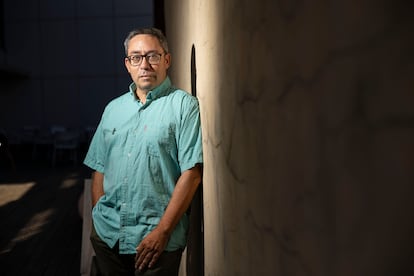José Luis Copete, ornithologist: ‘I never would have thought that birds were going to lead me to the love of my life in Iran’
The well-known Catalan naturalist married a biologist from Mashhad after living a love story worth of a novel


No one who knows Catalan ornithologist José Luis Copete, codirector of the radio program and podcast of note about birds, La Radio del Somormujo [The Grebe’s Radio], would have called him a romantic, and even less when you saw him surrounded by crows or when he told you about the time he obtained bird sperm in the Amazon by sucking it from a cloaca through a pipette. And yet, one day he fell like any other mortal into the clutches of love (or like a passerine into a charming and amiable snare), and has since lived one of those envious stories that seem to occur only in novels and films. Fascinated with Iran and its birds, he met through the internet, talking about their work, a 38-year-old Iranian biologist with eyes of unfathomable depth, Kordiyeh Hamidi, of the Ferdowsi University of Mashhad (FUM). Ferdowsi is the great Persian poet who wrote the poem Shahnameh, which tells of, among many other things, the romance of Zal and the princess Rudābeh. They fall in love and, after various cross-cultural experiences, wind up getting married by Muslim rites in Iran.
Question. Tell us the story!
Answer. Well, I meet Kordiyeh in 2015 exchanging messages when I was working on an all-mammal edition of an atlas for Lynx. I needed photographs of rats and she, aside from being an excellent photographer, is a specialist in calomyscids, rodents from the Middle East similar to gerbils, who live in the Iranian desert. We had an intense epistolary relationship before I knew she was a woman, because her name threw me off. She thought that was very funny.
Q. Perhaps talking about rodents is not the most promising start for a romantic relationship.
A. I didn’t realize who I was talking to until one day when I had to travel to Iran to open ornithological routes and she found out and was irritated that I hadn’t told her. ‘Wow, you could have let me know,’ she wrote me. So, I looked up her name and found out she was a woman, and very attractive. I thought, ‘You’re such an idiot, José Luis.’ And we arranged to meet.
Q. And how was that?
A. She is from Mashhad, a large city and pilgrimage site in the northeast, close to the border with Turkmenistan and Afghanistan. She’s a doctor of biology at FUM. Meeting her was beautiful.
Q. Even if you were united by nature (a phrase that does a lot of work here), was there a culture clash?
A. Well, it took me a while to win her over, but it would have been the same here, and now we get along very well. There are different traditions in Iran, an unmarried couple can find it difficult to be alone, hospitality is overwhelming, and they don’t let you help. Kordiyeh is a modern woman, of course, but she drags her culture along with her, as we all do. In general, Iranians are very friendly and want to know about people from other places. There are false stereotypes out there: many Iranian women study and have careers.
Q. You two got married.
A. Yes, this summer, for the moment just a civil ceremony. We are waiting to do the big Persian three-day wedding, which we’ve left for next year. The groom has to get a band and pass out golden coins.
Q. What does your family think?
A. My mother is fine, at first she was surprised. She and my sister and I traveled to Istanbul so they could meet Kordiyeh. She’s happy, and they’ve been able to connect. In my circles people, generally, were surprised.
Q. What are your plans?
A. After a lot of bureaucratic difficulty, she has been able to get a visa to come to Spain. We’ve made a pact that when I retire, we will return to live in her country. I have loved Iran since even before I met Kordiyeh. There are even some mountains that have the same name as me: Kopet Dag. And the birds are wonderful. The birds, in addition to the rat, is what brought me to Kordiyeh. I never would have thought that birds were going to lead me to the love of my life in Iran.
Q. What is your favorite Iranian bird?
A. Hypocolius, a relative of the waxwing. Kordiyeh has always been partial to mammals, but she is learning a lot about birds, she has a gift. Soon, she’ll jump ahead and know more than I do …
Q. That’s just twitcher in love speak.
A. Well, yes.
Sign up for our weekly newsletter to get more English-language news coverage from EL PAÍS USA Edition
Tu suscripción se está usando en otro dispositivo
¿Quieres añadir otro usuario a tu suscripción?
Si continúas leyendo en este dispositivo, no se podrá leer en el otro.
FlechaTu suscripción se está usando en otro dispositivo y solo puedes acceder a EL PAÍS desde un dispositivo a la vez.
Si quieres compartir tu cuenta, cambia tu suscripción a la modalidad Premium, así podrás añadir otro usuario. Cada uno accederá con su propia cuenta de email, lo que os permitirá personalizar vuestra experiencia en EL PAÍS.
¿Tienes una suscripción de empresa? Accede aquí para contratar más cuentas.
En el caso de no saber quién está usando tu cuenta, te recomendamos cambiar tu contraseña aquí.
Si decides continuar compartiendo tu cuenta, este mensaje se mostrará en tu dispositivo y en el de la otra persona que está usando tu cuenta de forma indefinida, afectando a tu experiencia de lectura. Puedes consultar aquí los términos y condiciones de la suscripción digital.








































